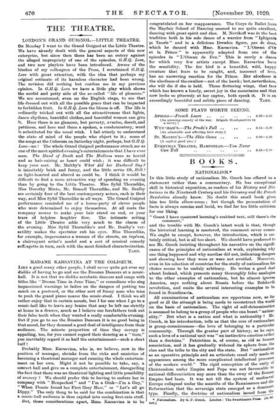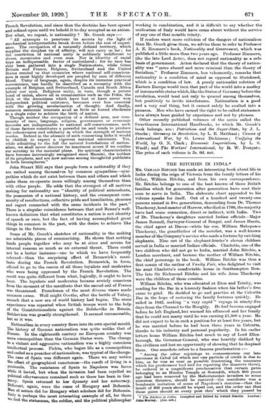BOOKS.
NATIONALISM.*
IN this little study of nationalism Mr. Gooch has offered us a statement rather than a commentary. He has exceptional
skill in historical exposition, as readers of his History and His- torians in the Nineteenth Century and his Germany and the French Revolution already know. No doubt this small book gives him too little elbow-room ; but though the presentation of facts is always concise emd lucid, we find far too little criticism for our liking.
"Grant I have mastered learning's crabbed text, still there's the comment," and the trouble with Mr. Gooch's latest work is that, though the historical learning is mastered, the comment never comes. We ought to except, however, the introduction, which is cer- tainly critical, but is all too short. We should have preferred to see Mr. Gooch insisting throughout his narrative on the signifi- cance of the principles of nationalism at work, explaining why one thing happened and why another did not, indicating dangers and showing how they were or were not avoided. Moreover, even in his selection of countries for the study of nationalism his choice seems to be unduly arbitrary. He writes a good deal about Ireland, which presents many thoroughly false analogies to the other examples of nationalism, but he almost ignores America, says nothing about Russia before the Bolshevik revolution, and omits the several interesting examples to he found in Scandinavia.
All examinations of nationalism are opportune now, as for good or ill the attempt is being made to reconstruct the world on the basis of nationalism. The right of eelf.determinaties is assumed to belong to a group of people who can boast " nation- ality." But what is a nation and what is nationality ? Mr. Gooch, in his introduction, tells us that the core of nationalism is group-consciousness—the love of belonging to a particular community. Through the greater part of history, as he says, such a love of a national unit was "an instinctive emotion rather than a doctrine." Patriotism is, of course, as old as human association, and it has gradually widened its sphere from the clan and the tribe to the city and the state. But "national's as an operative principle and an articulate creed only made to appearance among the more complicated intellectual presto,' of the modern world." The rigid conception of the unity of Christendom under Empire and Pope was not favourable to national differentiation any more than the sway of the Benno Empire had been. It was not till the system of mediaeval Europe collapsed under the assaults of the Renaissance and tha Reformation that the sovereign state emerged as a dominallt type. Finally, the doctrine of nationalism issued from the • hiatiosolima By Cr. P. Uorich. London : The Swarthmore Prom " nehl French Revolution, and since then the doctrine has been spread and refined upon until we behold it to-day accepted as an axiom. But what, we repeat, is nationality ? Mr. Gooch says :— "AU attempts to penetrate its secrets by the light of mechanioal interpretationa break down before the test of experi- ence. The occupation of a naturally defined territory, which supplies the simplest tie of affinity, will not carry us far ; for the conviction of national unity is sublimely indifferent to rivers, mountains and even seas. Nor is identity of racial type an indispensable factor of nationhood ; for no race has ever been gathered into a single Nation-state, while Great Britain and France, Belgium, Switzerland and. the United States remind us that countries where national self-conscious- ness is most highly developed are peopled by men of different blood. Unity of language, again, despite its immense practical convenience, can hardly be described as a necessity with the example of Belgium and Switzerland, Canada and South Africa before our eyes. Religious unity, in turn, though a potent bond of union, above all in communities such as the Poles, the Irish or the Armenians which have lost or have never won independent political existence, becomes ever less essential with the growing secularisation of thought. And finally, common economic interests avail as little as forced obedience to a single ruler to achieve the birth of nation. Though neither the occupation of a defined area, nor com- munity of race, language, religion, government or economic Interests are indispensable to national self-consciousness, each of these factors constitutes a powerful tie and tends to produce the cohesiveness and solidarity in which the strength of nations resides. Indeed in the absence of such connecting links it would be childish to expect a vigorous national sentiment. Yet, while admitting to the full the natural foundations of nation- alism, we shall never discover its innermost secret if we confine our scrutiny to the material plane. Its spiritual characteristics have beeome increasingly recognized since Mazzini, the noblest of its prophets, and are now tiaL1011113 among thoughtful publicists in both hemispheres."
John Stuart Mill says that people form a nationality if they are united among themselves by common sympathies—sym- pathies which do not exist between them and others and which make them co-operate more willingly among themselves than with other people. He adds that the strongest of all motives making for nationality are "identity of political antecedents, the possession of a national history, and the consequent com- munity of recollections, collective pride and humiliation, pleasure and regret connected with the same incidents in the past." There is a singular coincidence between that and Renan's well- known definition that what constitutes a nation is not identity of speech or race, but the fact of having accomplished great things in common in the past, with the desire to achieve like things in the future.
Some of Mr. Goon's sketches of nationality in the making are admirable pieces of summarizing. Ho shows that nothing binds people together who may be at sixes and sevens for internal reasons so much as an external threat. There could not be a better instance—one to which we have frequently referred—than the surprising effect of Brunswick's mani- festo during the French Revolution. Brunswick, in form, offered to go to the rescue of all those loyalists and moderates who were being oppressed by the French Revolution. The result was quite different from what, logically, it ought to have been. The loyalists and moderates became acutely conscious from the moment of the manifesto that the sacred soil of France was threatened. Frenchmen of the most diverse views made common cause. Well might Goethe, after the battle of Valmy, remark that a new era of world history had begun. The same experience was repeated when British troops went to the help of the Constitutionalists against the Bolsheviks in Russia. Bolshevism was greatly strengthened. It seemed unreasonable, but so it was.
Nationalism in every country flows into its own special mould. The history of German nationalism was quite unlike that of France. In the eighteenth century no European country was inure cosmopolitan than the German States were. The change to a violent and aggressive nationalism was a highly conscious intellectual process. Fichte, who began life as a cosmopolitan and ended as a preacher of nationalism, was typical of the change. The case of Spain was different again. There we may notice the effect of geographical remoteness—the result of living in a Penins. ula. The resistanoe of Spain to Napoleon was fierce While it lasted, but when the invasion had been repelled no Political effervescence remained such as there has been in Ger- many. Spain returned to her dynasty and her autocracy. Different, again, were the cases of Hungary and Bohemia. !den of action did for Rangary what scholars did for Bohemia. ItalY is perhaps the most interesting example of all, for there we find the statesman, the soldier, and the political philosopher working in combination, and it is difficult to say whether the unification of Italy would have come about without the service of any one of that notable trinity.
If readers want more criticism of the dangers of nationalism than Mr. Gooch gives them, we advise them to refer to Professor A. E. Zimmern's book, Nationality and Government, which was published a little more than two years ago. Professor Zimmern, like the late Lord Acton, does not regard nationality as a safe basis of government. Acton declared that the theory of nation- ality was "more absurd and more criminal than the theory of Socialism." Professor Zimmerli, less vehemently, remarks that nationality is a condition of mind as opposed to Statehood, which is a condition of law. A purely nationalist solution of Eastern Europe would turn that part of the world into a medley of innumerable states which, liko the Statea of Germany before the revolution, would tend not only to quarrel among themselves. but positively to invite interference. Nationalism is a good and a very real thing, but it cannot safely be exalted into a panacea. Men who have earned the right to be called statesmen have always been guided by experience and not by phrases.
Other recently published volumes of the series called the Swarthmore International Handbooks, to which Mr. Gooeh's book belongs, are : Patriotism and the Super-State, by J. L. Stocks ; Germany in Revolution, by L. E. Matthaei ; Causes of International War, by G. Lewes Dickinson ; Unifying the World, by Cl. N. Clark ; Economic Imperialism, by L S. Woolf; and The Workers' International, by R. W. Postgate. The price of each volume is 2a. 6d. net.



































 Previous page
Previous page